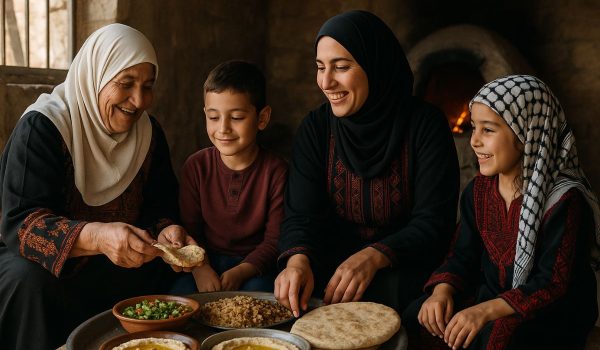Food is more than nourishment. It holds stories, memory, and strength. For communities that have faced displacement, loss, and struggle, traditional recipes carry more than flavor. They carry the will to survive and the desire to preserve identity across time and distance.
In Palestinian kitchens, food becomes a form of resistance and remembrance. Simple ingredients tell stories of land, family, and dignity. Passed down through generations, these dishes keep culture alive even when borders shift and homes are taken. They remind people who they are, no matter where they are.
What This Article Covers
This article explores how food traditions reflect resilience. It highlights how recipes preserve culture, how meals become acts of care, and how cooking connects people to home—even in exile.
You’ll read about the ways food helps communities hold on to their roots, why certain dishes carry emotional meaning, and how preparing them becomes an everyday form of strength and resistance.
Memory in Every Bite
Many food traditions begin in memory. A grandmother’s hands kneading dough, the smell of za’atar warming on bread, or the sound of lentils simmering in a pot. These moments are woven into everyday life and carry meaning far beyond the ingredients.
For Palestinians living under occupation or in diaspora, making these dishes brings comfort. It creates a space where home is present, even if it’s far away. Each bite recalls stories of harvests, family gatherings, and shared struggle.
Food becomes a form of storytelling. Recipes aren’t just followed—they are remembered. Adjusted slightly, passed down quietly, and kept alive with every repetition.
Adapting Without Losing Meaning
Sometimes the original ingredients are missing. Sumac may be hard to find, or the wheat used for taboun bread may not be available. But that doesn’t stop the cooking. People adapt. They substitute. They keep the heart of the dish intact even as the setting changes.
This flexibility speaks to a deeper resilience. Holding on to tradition doesn’t always mean exact repetition. It means holding on to what matters most—the feeling, the ritual, the meaning.
Even in refugee camps, temporary homes, or urban apartments far from ancestral villages, the essence of the meal stays strong. It reminds people that even if they cannot return to the land, the land lives on in the kitchen.
Food as a Form of Resistance
When homes are demolished and fields are confiscated, food becomes one of the last links to a way of life. Growing herbs in containers, preserving olives, or baking ma’amoul at holidays takes on new weight. These are not just habits. They are acts of continuity.
Sharing these foods with others—especially in the face of attempts to erase or rewrite history—is an act of presence. It says: We are still here. Our culture is intact. Our stories matter.
This is why food often shows up in protests, fundraisers, and community events. It feeds bodies and spirits. It brings people together around something familiar and grounding.
Teaching Through Cooking
One of the most beautiful ways food traditions stay alive is through teaching. Parents and grandparents invite children into the kitchen, not just to help, but to learn. Measuring flour becomes a lesson in patience. Folding grape leaves becomes a lesson in care.
These moments build connection across generations. They allow children to feel part of something bigger. They teach pride in where they come from, and offer comfort in times of confusion or change.
Even when formal history is not taught, the kitchen becomes a classroom. Children learn about villages, seasons, and the meaning behind every meal. They grow up with tastes and smells that ground them.
Diaspora Kitchens and Shared Identity
Across the world, Palestinian communities in the diaspora have kept food traditions alive. Whether in Chile, Lebanon, Canada, or the United States, families recreate familiar dishes and share them in new contexts.
Community dinners, potlucks, and cooking workshops bring people together. They allow younger generations to connect with culture and older generations to pass on knowledge. They also introduce non-Palestinians to the richness and variety of Palestinian cuisine.
These meals often come with stories. Someone will mention how their grandmother made a certain dish, or how they remember eating it during Eid. Through these conversations, identity is not only preserved—it is shared and strengthened.
Everyday Acts That Matter
Preparing food doesn’t always feel like a big deal. But when traditions are at risk, even the smallest act can hold great meaning. Rolling dough, growing mint, or teaching someone to make lentil soup becomes part of a larger story.
These actions are grounded in daily life. They don’t need headlines or fanfare. They work quietly, building cultural memory and community connection. They are proof that tradition continues, even in small kitchens and temporary spaces.
When families gather around a meal that has been made the same way for decades, they are not just feeding themselves. They are honoring history and protecting the future.
Holding On With Care
Food traditions rooted in resilience are more than a cultural reference. They are part of how communities survive loss, rebuild identity, and claim space. They remind people of what cannot be taken—flavor, memory, connection.
These traditions are acts of love passed through generations. They hold the stories of the land, the people, and the struggle to stay whole. And they continue to grow, plate by plate, kitchen by kitchen, wherever there is someone willing to cook, remember, and share.

